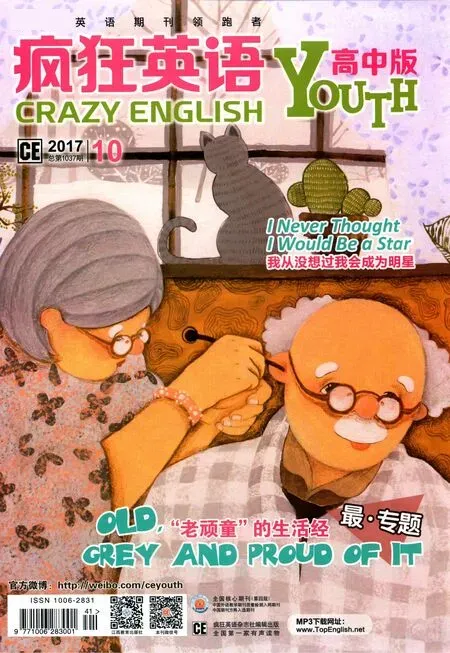OLDER PEOPLE ARE HAPPIER老年人更快乐
2017-10-12ByLauraCarstensen翻译思苇
⊙By Laura Carstensen ⊙ 翻译:思苇
OLDER PEOPLE ARE HAPPIER老年人更快乐
⊙By Laura Carstensen ⊙ 翻译:思苇
都说老龄化问题是现代社会面临的最大挑战之一,各国政府纷纷出台各种相关政策,应对日益严峻的养老形势——但是,你知道吗?根据多项权威社会调查,老年人竟然是幸福感最高的人群!没想到吧,听听心理学家Laura对此的分析……
People are living longer and societies are getting grayer.You hear about it all the time.You read about it in your newspapers.You hear about it on your television sets.Sometimes,I’m concerned that we hear about it so much that we’ve come to accept longer lives with a kind of1)complacency [kəm΄pleɪsənsɪ] n.自满,自鸣得意complacency,even ease.
Now there are problems associated with aging—diseases,2)poverty [΄pɒvətɪ] n.贫穷,贫困poverty,loss of social status.It’s hardly time to rest on our3)laurel [΄lɒr(ə)l] n.桂冠,荣誉laurels.But the more we learn about aging,the clearer it becomes that a sweeping downward course is4)grossly [΄grəʊslɪ] adv.很,非常grosslyinaccurate.Aging brings some rather remarkable improvements—increased knowledge,expertise—and emotional aspects of life improve.
That’s right,older people are happy.They’re happier than middle-aged people,and younger people,certainly.
The5)CDC 美国疾病控制预防中心(Centers for Disease Control)的首字母缩写CDCrecently conducted a survey where they asked6)respondent [rɪ΄spɒnd(ə)nt] n.应答者,调查对象respondentssimply to tell them whether they experienced significant psychological7)distress [dɪ΄stres] n.痛苦,困扰distressin the previous week.And fewer older people answered8)affirmatively [ə΄fзːmətɪvlɪ] adv.肯定地,断然地affirmativelyto that question than middleaged people,and younger people,as well.
So how can this be? Well,in our research,we’ve found that these changes are9)ground [graʊnd] v.基于,建立在groundedfundamentally in the uniquely human ability to10)monitor [΄mɒnɪtə(r)] v.监测,监控monitortime—not just clock time and calendar time,but lifetime.And if there’s a11)paradox [΄pærədɒks] n.悖论,反论paradoxof aging,it’s that recognizing that we won’t live forever changes our perspective on life in positive ways.When time12)horizon [hə΄raɪz(ə)n] n.地平线,眼界,范围horizonsare long and13)nebulous [΄nebjʊləs] adj.雾状的,朦胧的nebulous,as they typically are in youth,people are constantly preparing,trying to14)soak up 吸收soakupall the information they possibly can,taking risks,exploring.We might spend time with people we don’t even like because it’s somehow interesting.You know,we might learn something unexpected.We go on15)blind date 相亲blind dates.You know,after all,if it doesn’t work out,there’s always tomorrow.
People over 50? Don’t go on blind dates.
As we age,our time horizons growshorter and our goals change.When we recognize that we don’t have all the time in the world,we see our16)priority [praɪ΄ɒrɪtɪ] n.优先,优先事项prioritiesmost clearly.We take less notice of17)trivial [΄trɪvɪəl] adj.琐碎的,无关紧要的trivialmatters.We18)savor [΄seɪvə(r)] v.品尝,尽情享受savorlife.We’re more19)appreciative [ə΄priːʃɪətɪv] adj.感激的,感谢的appreciative,more open to20)reconciliation [ˌrekənsɪlɪ΄eɪʃ(ə)n] n.和解,妥协reconciliation.We invest in more emotionally important parts of life,and life gets better,so we’re happier day-to-day.
What will happen to societies that are top-heavy with older people? The numbers won’t determine the outcome.Culture will.If we invest in science and technology and find solutions for the real problems that older people face and we21)capitalize [΄kæpɪtəlaɪz] v.利用capitalizeon the very real strengths of older people,then added years of life can22)dramatically [drə΄mætɪkəlɪ] adv.显著地,引人注目地dramaticallyimprove quality of life at all ages.
My father,who is 92,likes to say,“Let’s stop talking only about how to save the old23)folk [fəʊk] n.人们,特定阶级的人(复数形式)folksand start talking about how to get them to save us all.”
It’s hardly time to rest on our laurels.


参考译文
人们的寿命越来越长,社会逐渐走向老龄化。你经常听到这种话,在报纸上读过,在电视上看过。有时候,我会有点担心,因为这样的话听多了,我们开始带着一种有点儿自满——甚至安逸的态度来接受长寿这个事实。
衰老会带来各种各样的问题,包括疾病、贫困,以及社会地位的丧失等。这可不是满足于现状的时候。不过,我们越是进行研究,事情就变得越发清晰——把衰老看作一条势不可挡的下坡路是非常不准确的。衰老也会带来一些非同寻常的进步,例如知识更加渊博,专业更加精深,人的情绪层面也会随之进步。
没错,老年人是快乐的——他们比中年人快乐,当然也比年轻人快乐。
美国疾病控制预防中心最近进行了一次调查,他们要求受访者简单回答在过去一周里是否经历过重大的心理困扰。对此做出肯定回答的老年人远少于中年人,也比年轻人少。
这是为什么呢?我们在研究中发现,这些改变植根于人类一种独特的能力——监控时间,不仅是时钟的时间和日历的时间,还包括生命的时间。如果说真有什么衰老悖论,那也是因为我们认识到自己无法永生,我们的人生观变得更为积极。年轻时总觉得人生的终点遥远又朦胧,所以人们总是跃跃欲试,希望尽可能地吸收各种信息,乐于冒险,到处探索。我们或许会跟不喜欢的人共度时光,因为这种感觉挺有趣的。我们或许会从中学到一些意想不到的东西。我们会去相亲——你瞧,说到底,哪怕遭遇失败,明天还是会到来的。
而年过半百的人呢?已经不去相亲了。
随着年龄的增长,我们与人生终点的距离在不断缩短,我们的人生目标也不一样了。当我们意识到自己的时间并非无限,我们就能清楚看到自己的优先项,对琐碎之事的关注变少了,开始享受人生,更懂得感恩,更愿意和解。我们更专注于情感层面上的重要事情,生活变得更美好,因而快乐日增。
当社会因为老年人过多而出现头重脚轻的人口结构时,会发生什么事情呢?人口比例并不能左右最终结果——文化才会。如果我们投入科学技术,为老年人面临的实际问题找出解决之道,如果我们能够充分发挥老年人的真正优势,人类寿命的延长将会极大提升所有年龄层的整体生活质量。
我父亲已经92岁了,他爱说这样的话:“不要再嚷嚷解救老年人了,我们来谈谈如何让老年人解救所有人吧。”
